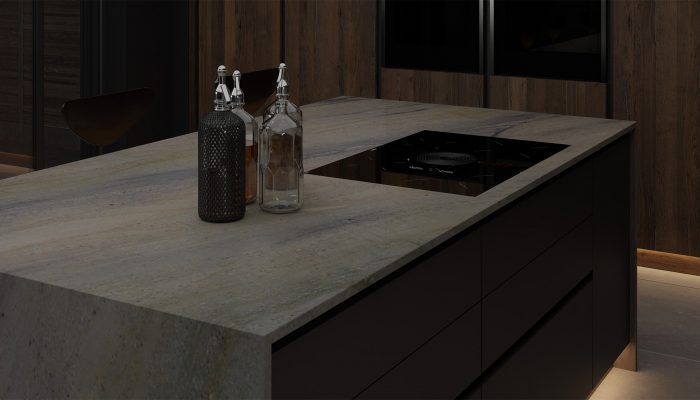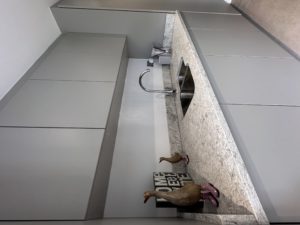The Pros and Cons of Quartz Worktops
Deciding on whether quartz worktops are right for your kitchen? This article cuts through the noise and gives you the straightforward Quartz worktop pros and cons. We cover the essential points from their durability and ease of maintenance to costs and heat vulnerability.
Key Takeaways – Quartz Countertop Pros & Cons
- Quartz kitchen countertops blend design and durability with stain-resistant, non-porous surfaces, but expect higher starting costs than laminate.
- Quartz has a homogeneous, customisable appearance with a variety of colours and patterns, and it is more environmentally friendly than certain alternatives because to sustainable manufacturing procedures.
- While quartz countertops are low-maintenance and hygienic, expert installation is advised due to the precision required, and they can increase the value of your property.

The appeal as well as difficulties of quartz worktops
Quartz worktops, which are made up of 90-95% real stone mixed with chemical resins and colours, provide a rich appearance that many homeowners desire. Their appeal isn’t simply superficial; these countertop materials are prized for their elegant appearance and durability.
Presenting the Benefits
Quartz worktops are more than just an attractive surface. Their non-porous nature prevents liquids like as oil, juice, wine, and coffee from seeping in, making them stain-resistant. This also makes them antibacterial, which means they won’t harbour bacteria or mould—ideal for health-conscious homeowners.
Furthermore, unlike natural stones, quartz does not require sealing, making cleaning and upkeep easier. This increases the longevity and convenience of your kitchen surface.
Potential Drawbacks to Consider
No countertop material is flawless, including quartz. One notable disadvantage is its susceptibility to high temperatures—placing hot pots directly on the surface can cause discolouration or irreversible damage. It is also more expensive than some other materials, so cost-conscious homeowners may want to consider their options.
Furthermore, quartz countertops come with a higher upfront cost when compared to some other countertop materials.
Delving into the Durability of Quartz
One of the shining features of quartz countertops is their exceptional durability. Here are some reasons why:
- Made up of 90-95% natural quartz crystals mixed with resins and pigments
- Less prone to scratching and staining compared to natural stones such as marble
- Less susceptible to staining or cracking due to their non-porous nature
- Withstand daily wear and tear and stay looking fresh for years to come
Plus, many quartz countertops come with warranties ranging from 10 years to the lifetime of the home, indicating their long-term durability.
Withstanding Daily Wear and Tear
Quartz provides the durability that busy kitchens require. Quartz is engineered to withstand spills, stains, and scratches, keeping your kitchen looking new for years.
Limitations Under Extreme Conditions
Despite its strength, quartz is not invincible. High temperatures can harm the resin, causing cracks or discolouration. It’s advisable to use trivets and minimise prolonged exposure to high heat.
Quartz Worktops: Aesthetic Versatility
Quartz countertops offer endless design options, including:
- Appearances resembling granite or marble
- Light and simple patterns
- Deep colours
- Intricate designs
- Attributes that can hide seams
- Fully customisable to personal taste
The advanced manufacturing technology of quartz ensures a consistent aesthetic quality, providing a sophisticated, polished, and refined look that adds a high-end feel to kitchens.
Plus, quartz can closely resemble natural stones such as granite or marble, boasting a higher gloss finish that adds further depth and luxury to its appearance.
 Tailoring to Personal Preferences
Tailoring to Personal Preferences
Quartz worktops can be made to order, customised in size and shape to fit specific kitchen designs, including the option to specify desired thicknesses and providing customised plans or drawings for personalised worktops.
Customers can tailor the appearance of quartz worktops, with options ranging from smooth to flecked surfaces, based on the coarseness of the ground quartz crystal.
Consistency vs. Natural Variation
In contrast to the unique veining and patterns of natural stones like granite and marble, quartz worktops are known for their uniformity and lack of natural variation. This consistency in design sets quartz apart from natural stones, making it an excellent choice for homeowners seeking a predictable and uniform aesthetic.
Cost Analysis: Quartz Countertops Investment
Investing in quartz countertops can be substantial, with the cost being influenced by factors such as the brand, the material quality, and the design complexity. The investment in quartz countertops can increase significantly with additional features like kitchen islands, upstands, and splashbacks.
However, less complex designs and standard thickness slabs present budget-friendly options for quartz countertops.
Professional vs. DIY Quartz Worktops Installation
Pondering over a DIY project for installing your quartz countertops? You might want to reconsider. When installing quartz countertops, achieving a successful outcome depends on precision and expertise. These qualities are essential for ensuring a high-quality and long-lasting installation. Attempting to install quartz countertops as a DIY project presents significant challenges, including difficult precision cuts and the need for special seaming methods.
Therefore, due to the complexity and expertise required, it is highly recommended to hire professionals for the installation of quartz countertops.
Expert Installation As Part of the Process
Professional installation of quartz countertops encompasses meticulous steps like site preparation, dry fitting, and securing the quartz worktop with suitable adhesives. They also handle the heavy lifting, as quartz’s hefty weight, at about 20 pounds per square foot, requires professional installers to manage the secure placement of the countertop. Plus, installers bring added value by advising on quartz material choices, maintenance, and handling unexpected challenges that may arise.
And not to forget, expert installers have liability insurance that protects against any damages or injuries that could occur during the countertop installation process.
Hygiene and Health: Quartz’s Hygienic Surface
Hygienic properties stand as one of the key advantages of quartz countertops. Engineered from natural quartz stone, pigments, and resins, quartz creates a robust, non-porous, and highly customizable surface, which does not require sealing, contributing to its hygienic features.
Some of the hygienic features of quartz countertops include:
- Its non-porous nature means quartz does not harbour bacteria or germs
- It is resistant to stains, making it easy to clean and maintain
- It does not require sealing, reducing the risk of bacteria growth
- It is highly durable and resistant to scratches and chips
These features establish quartz as a highly hygienic choice for kitchen countertops, making them one of the quartz countertops pros.
The resistance of quartz worktops to water, mould, and bacteria due to their physical durability enhances their suitability as a hygienic surface in various environments, especially kitchens.
Quartz vs. Granite: Battle of the Stones
In the comparison of stones, how does quartz measure up against granite? Here are some key differences:
- Granite is more heat resistant than quartz, but it requires the use of protective sealants.
- Quartz’s resin can be damaged by high heat.
- Quartz requires less maintenance than granite, as it is nonporous and does not need sealing.
- Granite’s sealing needs to be regularly maintained to prevent staining.
Lastly, the design consistency of quartz countertops sets them apart from granite, which has a unique and varied appearance, including natural imperfections.
Caring for Your Quartz Countertop
Among the best attributes of quartz countertops is their exceptionally low maintenance; they do not require sealing or polishing. Regular maintenance can help keep quartz worktops looking pristine for an extended period.
For daily cleaning, a simple wipe with a soft cloth or sponge with mild dish soap and water is all it takes to clean quartz countertops. And to prevent damage to the quartz surface, ensure to use cutting boards and avoid using knives or sharp objects directly on the countertop.
In conclusion, quartz countertops offer a compelling blend of beauty, durability, and versatility, making them an excellent choice for any kitchen. While they may have a higher initial cost and be sensitive to high heat, their aesthetics, low maintenance, and long-term value make them a worthy investment.
Remember to consider your personal style preferences and kitchen functionality when choosing the perfect quartz worktop for your home.
Quartz Pros & Cons FAQs
What are the negatives of quartz countertops?
Quartz countertops can be expensive and may not be suitable for tight budgets. They are also vulnerable to heat damage and may have noticeable seams, making installation difficult. Therefore, they’re not recommended for outdoor use.
Are quartz worktops a good idea?
Yes, quartz worktops are a great idea especially if you value functionality and low maintenance. They are highly durable, easy to clean, and non-porous, making them ideal for food preparation areas.
Do quartz worktops chip easily?
Quartz worktops are durable and resistant to chipping, thanks to their hardness. While they are less prone to damage from everyday wear and tear, accidents can still happen.
Do quartz worktops mark easily?
Quartz worktops are relatively stain-resistant due to their low porosity, making them less prone to marks compared to other natural stone surfaces. However, it’s still important to be careful with messes and spills.
What makes quartz countertops so popular?
Quartz countertops are popular because they are stylish, durable, resistant to staining and scratching, and can be customised to fit personal preferences and kitchen designs, making them a versatile and attractive option.

 Tailoring to Personal Preferences
Tailoring to Personal Preferences